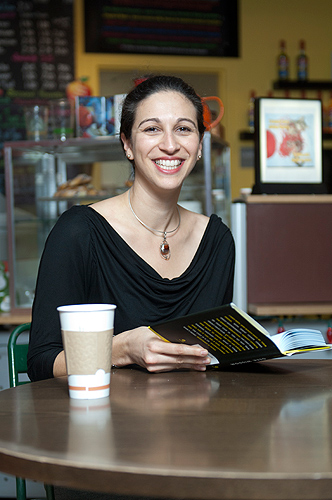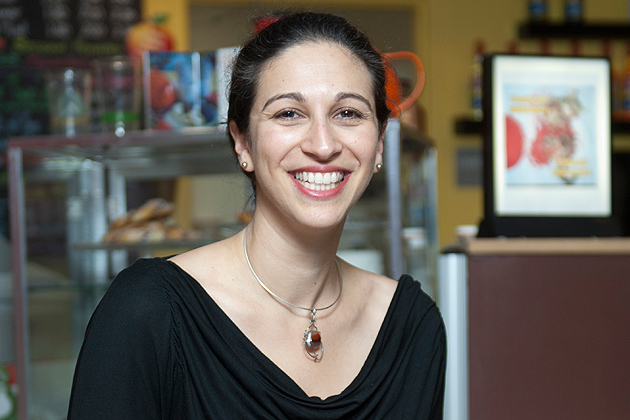
Should undocumented immigrants be entitled to health care? And if so, on what grounds?
That simple but fraught question forms a central focus of Sarah Willen’s work.
Since 2000, Willen, an assistant professor of anthropology in the College of Liberal Arts and Sciences, has been investigating the recent phenomenon of undocumented migration to Tel Aviv, Israel, from countries as distant as Nigeria, Ghana, and the Philippines. Today, these undocumented residents comprise more than 150,000 of the country’s 7.5 million inhabitants.
While there, watching the everyday struggles of these migrants, she learned that not all reasons to give care – or not to – are the same.
“There’s an assumption that we’re not obliged to provide care because these individuals have done something illegal,” Willen says. “We have to start by rethinking our everyday assumptions about ‘illegality’ and, at the same time, considering what it would mean to organize society in a way that treats health care as a basic right.”
The idea of health care as a basic human right is often based on an assumption of biolegitimacy, or the recognition that all humans are entitled to live and to be healthy. But in practice, Willen says, the “right to health” is a lot more complicated: whether it should be a legal instrument, a framework for policy, or simply a moral understanding is often unclear.
And in the case of undocumented migrants, she notes, there is often a raging debate about whether or not they are “deserving.”
What Willen finds fascinating about Israel, especially in comparison with the U.S., is that health care has historically been a social contract, or part of what Israelis expect the government to provide in exchange for their contributions to society.
“As a result, people who care about undocumented migrants’ health are basically just saying look, we already have a strong public commitment to health for all as a public good – and ‘all’ includes undocumented migrants,” she says.
These types of arguments typically don’t fly in the U.S., because unlike education, libraries, roads, and bridges, health care is not something Americans expect their government to provide.
“Instead, most Americans treat health care primarily as something to be bought and sold, not unlike tomatoes, or sweaters, or haircuts,” explains Willen. “Given this commodity mentality, most Americans don’t have an intuitive sense – as do Israelis and many Western Europeans – that health is a public good.”
A key site for Willen’s research is a Tel Aviv clinic that provides health care to the city’s migrant population. The open clinic, run by an Israeli health and human rights organization, includes volunteer doctors and activists who, Willen discovered, all had different reasons for participating. Some believed that health care was a basic human right, some wanted Israel’s immigration laws to change, and others just couldn’t bear to see people suffer.
“I was fascinated by what the Israeli migrant advocates were doing in the community,” she says. “They all framed their struggles and goals differently.”
One doctor, for example, came to volunteer in the clinic because she wanted to help Palestinians still in Israel, but then stayed because she realized that undocumented workers had nowhere else to turn. Another, who volunteered only sporadically, was wracked with guilt after treating a patient with breast cancer; because he didn’t follow up on her case: the cancer worsened until it became terminal.
Willen observed that no matter their political and personal differences, the similarity among health advocates at the clinic was their refusal to assert that undocumented migrants are not deserving of concern and attention.
But what about the United States, where one of the most debated topics among politicians is what should be done about immigration? What would it take for this country to consider offering health care to people who migrate without papers?
Willen contends that it’s easy to describe those who migrate without papers as undeserving of health care because their role in society goes largely unnoticed. She says that by ascribing “illegality” to these undocumented agricultural workers, meat packers, or tobacco growers, we ignore the fact that our economic system depends on their labor.
“We expect to pay $2.99 for a box of strawberries instead of $4.99 or $8.99, and it’s only by paying migrant workers below minimum wage and denying them health benefits,” she says. “Few Americans are willing to admit this.”
So, Willen concludes, it’s hard to convince Americans that they’re part of the same economy and community as undocumented workers – and even harder to make the case that they deserve health benefits.
As an anthropologist, Willen sees a need to talk about this interconnectedness, so that more people can see the moral obligations society has in providing health care and, more broadly, to simply look out for one another.
“What we do well as anthropologists is to tell stories,” she says. “There should be more research on this type of connectedness. That will obligate us as citizens to see that we’re part of a bigger picture.”
The journal Medical Anthropology Quarterly published a research article and a commentary by Willen in its most recent issue. Co-authors on the commentary article are Jessica Mulligan of Providence College and Heide Castañeda of the University of South Florida.



